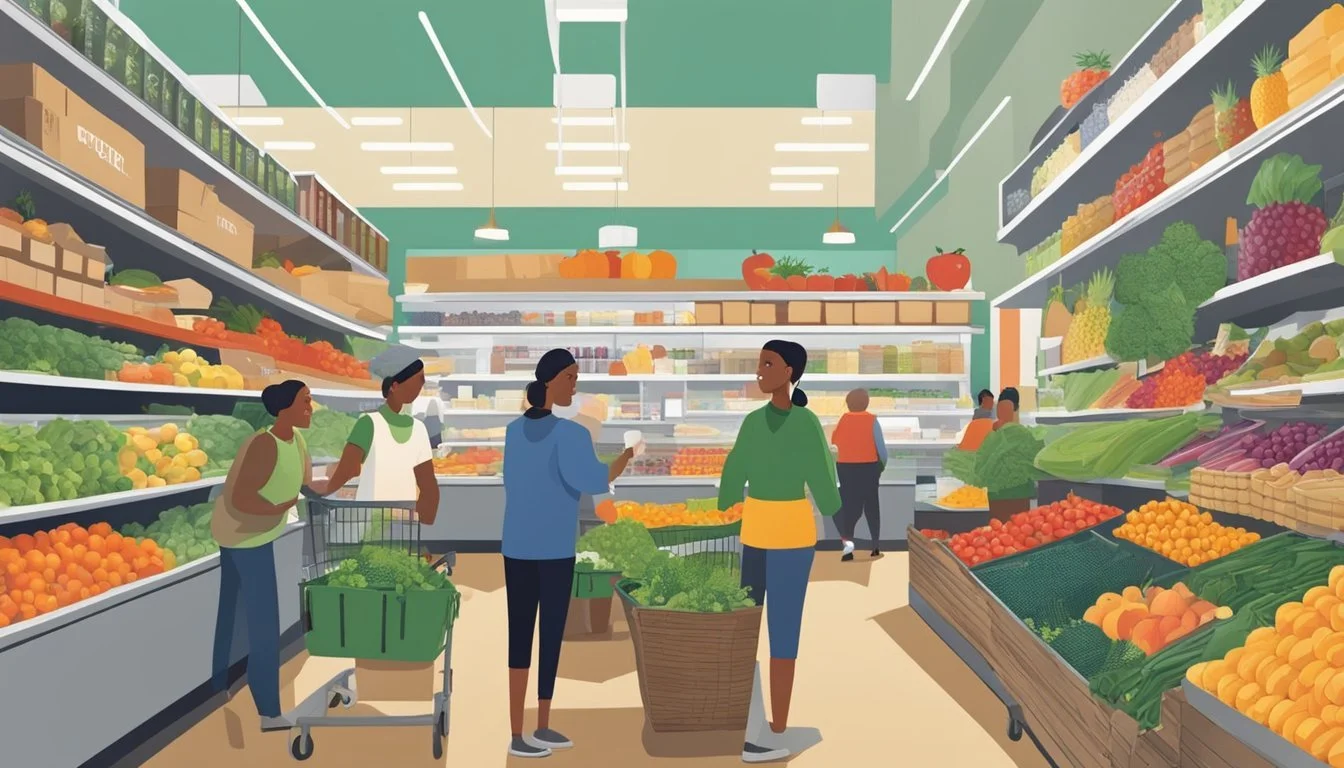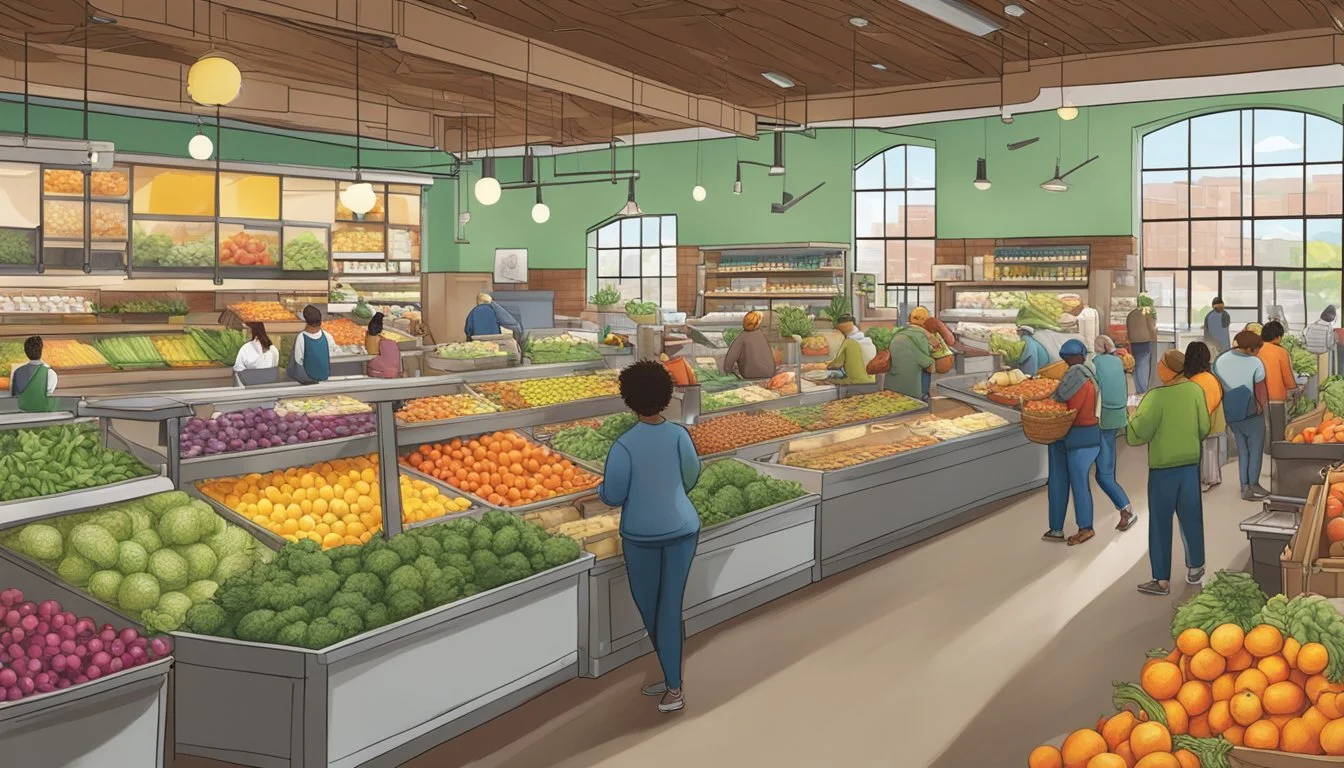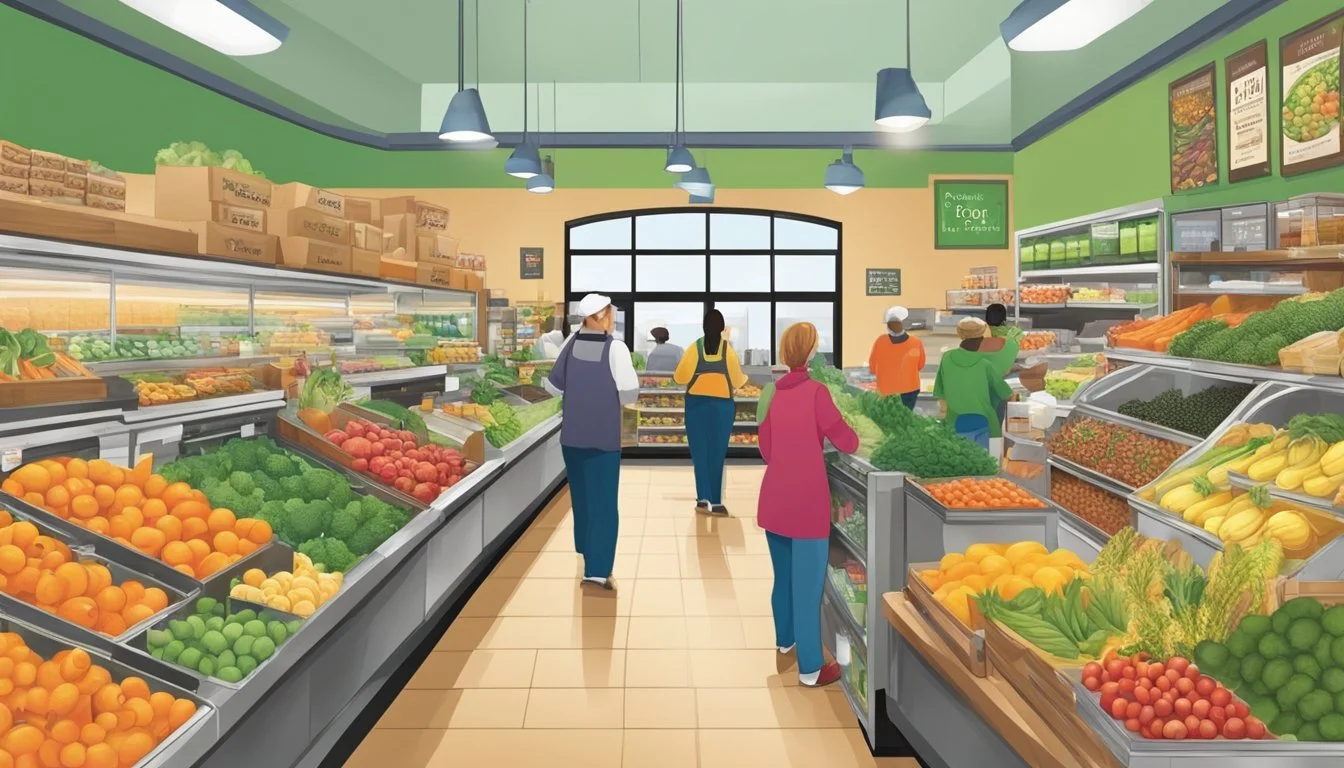Guide to Food Co-Ops in Pittsburgh, PA
Your Essential Resource
Pittsburgh, known for its rich industrial history and resilient community, has seen a growth in sustainable living practices and community-oriented business models. Among these are food co-operatives, or food co-ops, which are collectively owned grocery outlets that operate for the benefit of their members and the wider community. These co-ops focus on providing access to high-quality, locally-sourced, and often organic food products. Emphasizing sustainability, food co-ops in Pittsburgh contribute to the local economy by supporting area farmers and artisans, and by offering consumers an alternative to conventional grocery stores.
The city's food co-op movement traces its documented roots back to 1972 with the establishment of the Semple Street Food Co-op into what was once a corner drug store in Oakland. This and other co-ops like the East End Food Co-op, which has been a staple for over four decades, embody a commitment to community engagement and environmental responsibility. These institutions are not merely places to purchase groceries; they are integral parts of their neighborhoods, providing not only sustenance but also a communal space for education and the exchange of ideas about food and sustainability.
These cooperative endeavors in Pittsburgh reflect a broader movement toward conscious consumption and collective ownership. By prioritizing the needs of their members over profits, food co-ops reinforce the values of cooperation and egalitarianism within the Pittsburgh community. In doing so, they also become key players in efforts to improve food security, nutrition, and the overall health of the community they serve.
The Fundamentals of Food Co-Ops
In Pittsburgh, Pennsylvania, food co-ops serve as a testament to the power of collective community effort, offering member-owned alternatives that prioritize local and sustainable food. Understanding these organizations is crucial for appreciating their impact and considering membership.
Defining a Food Co-Op
A food co-op, or cooperative, is a grocery entity that operates on a membership basis and is owned and controlled by the members who use its services. These organizations adhere to the cooperative principles, which emphasize voluntary and open membership, democratic member control, member economic participation, autonomy, education, cooperation among cooperatives, and concern for community.
History of Food Co-Ops in Pittsburgh
Pittsburgh has a rich history of food co-ops, exemplified by the East End Food Co-op, established in 1980. It persists as the city's sole member-owned market that specializes in natural and organic foods. These co-ops emerged as part of a larger movement that gained momentum in the 1960s, continuously adapting to the community's changing needs.
Benefits of Joining a Food Co-Op
Members of food co-ops typically enjoy numerous advantages, including a say in the business operations through democratic voting. They gain access to high-quality, locally-sourced, and sustainable food, often at better prices due to the cooperative's economic model. Furthermore, food co-ops are known for fostering environmental responsibility and social well-being within the local community.
Becoming a Member
Joining a food co-op in Pittsburgh, PA, offers individuals a chance to become part of a member-owned grocery entity that provides economic, social, and cultural benefits. Co-ops like the East End Food Co-op (EEFC) emphasize a sustainable and democratic approach to grocery shopping.
Membership Types
EEFC offers a specific type of membership that is open to everyone. To join, individuals are required to provide a state-issued ID, such as a driver's license, government-issued ID, passport, or residency card.
Membership Benefits
Members of the co-op receive various benefits, including:
Discounts: Lower prices on products and special discounts on co-op events.
Democratic Participation: Members have a say in important decisions, exemplifying the co-op's democratic structure by voting on matters that shape the organization.
Community Connection: Membership cultivates a dynamic community of people focused on health and sustainability.
How to Join a Food Co-Op
To join a food co-op like EEFC, the individual should:
Verify Eligibility: Ensure they have the required form of ID.
Apply: Complete the membership application process, which can typically be done at the co-op's physical location or through its official website.
Investment: Pay any required membership fees, aiding in the financial sustainability of the co-op.
Joining the EEFC specifically allows access to the EEFC Federal Credit Union, further enabling financial services tailored for the community.
Local Co-Ops in Pittsburgh
Pittsburgh boasts a variety of food co-operatives that provide residents with access to high-quality, sustainable, and locally sourced food options. These co-ops are an integral part of the community, emphasizing environmental responsibility and support for local producers.
East End Food Co-Op
Location: Pittsburgh, PA
Address: 7516 Meade Street
Contact: (412) 242-3598
Website: East End Food Co-op
The East End Food Co-Op is Pittsburgh’s only member-owned natural and organic foods grocery store, and it serves as a vital part of the Homewood neighborhood. Celebrating over 40 years in operation, the co-op is over 15,000 members strong. It's widely recognized for its commitment to nourishing food, sustainability, and the local community. Being situated in an urban setting, the co-op provides a unique platform for the community to access organic produce, hormone and antibiotic-free meats, and GMO-free products amongst other healthy options.
Other Notable Food Co-Ops
Wild Purveyors
Offers a selection of certified organic products, including sustainable farm-fresh produce and grass-fed meats.Erie Food Co-op
Though it's not within Pittsburgh, the Erie Food Co-op serves the broader Pennsylvania community with locations for both members and non-members.
Comparison of Co-Ops
Product Selection:
East End Food Co-Op: Wide range of natural and organic foods
Others: Focus varies from local, sustainable produce to specialty items
Ownership:
East End Food Co-Op: Member-owned, with a large base of over 15,000 members
Others: Member policies differ, and some are also open to non-members
Community Role:
East End Food Co-Op: Long-standing community staple with a focus on environmental responsibility
Others: Serve unique niches in both Pittsburgh and the greater Pennsylvania area
Each co-op in Pittsburgh has its own unique attributes, but they all share a common goal to provide access to high-quality, sustainable food and support local suppliers.
Shopping at Food Co-Ops
Food co-ops in Pittsburgh offer a unique shopping experience with an emphasis on community-driven values and sustainable practices. They prioritize organic and locally-sourced items, allowing consumers to buy fresh and natural products while supporting local artisans and growers.
Product Selection
At Pittsburgh's food co-ops, shoppers can expect a handpicked selection of goods that extend beyond what a conventional grocery store offers. Product range typically includes:
Local Produce: Fresh fruits and vegetables from regional farms.
Artisan Products: Handcrafted items made by local artisans.
Certified Organic Goods: A broad array of organic food options.
These co-ops cater to the community's needs by fostering a connection between consumers and the source of their food.
Understanding Bulk Foods
Bulk foods are a cornerstone of food co-ops, providing an eco-friendly shopping option that minimizes waste. When purchasing bulk items, customers should know:
Quantity Control: Buy as much or as little as needed.
Diverse Selection: Find grains, nuts, spices, and more in bulk.
Environmentally Friendly: Less packaging reduces waste.
Purchasing bulk allows for customers to experiment with quantities and ingredients not usually available in pre-packaged forms.
Finding Organic and Natural Options
Food co-ops excel in offering an extensive range of organic and natural options. Customers can often find:
Certified Organic Products: Items that comply with organic certifications.
Natural Choices: Foods that area minimally processed.
These co-ops are committed to providing options that promote health and sustainability while supporting organically produced goods.
Supporting Local and Sustainable Practices
Pittsburgh food co-ops connect consumers with local farmers and suppliers, promoting sustainable agriculture and eco-friendly initiatives. These cooperative efforts reinforce a sustainable regional food infrastructure that prioritizes the triple bottom line—people, planet, and profit.
Local Farmers and Suppliers
Food co-ops in Pittsburgh, such as the East End Food Co-op, support local farmers and suppliers, ensuring that consumers have access to fresh, locally produced goods. These relationships help sustain the local economy and reduce the carbon footprint associated with long-distance transportation of food.
Local Sourcing: Co-ops prioritize purchasing from local producers.
Community Engagement: They often host events and markets that feature local suppliers.
Sustainable Agriculture
The focus on sustainable agriculture means that food co-ops support farming practices that maintain soil health, conserve water, and reduce chemical usage. This aligns with the city’s efforts toward creating an environmentally-friendly food system.
Organic Products: Availability of products grown without synthetic pesticides or fertilizers.
Education: Co-ops serve as educational hubs for sustainable food practices.
Eco-Friendly Initiatives
Pittsburgh food co-ops champion eco-friendly initiatives by implementing waste reduction strategies and encouraging circularity — where materials and products are reused and recycled to minimize waste.
Zero Waste Goals: Programs aimed at reducing packaging and food waste.
Green Practices: Use of biodegradable materials and support for energy-efficient operations.
Through these focused actions, Pittsburgh's food co-ops play a pivotal role in fostering a sustainable regional food infrastructure, with a clear commitment to environmental stewardship.
Educational Opportunities and Community Events
Food co-ops in Pittsburgh offer a range of educational opportunities and community events aimed at promoting sustainable food practices and fostering engagement. These events range from hands-on workshops to informative meetups, strengthening both individual knowledge and the communal fabric.
Workshops and Classes
The East End Food Co-op frequently hosts workshops and classes on topics like fermentation, sustainable cooking, and food justice. Recent offerings include a beginner's guide to Koji and Miso, illustrating the co-op's dedication to hands-on fermentation education. These sessions cater to various skill levels, ensuring accessibility to all community members.
Co-Op Café and Meetups
The co-op's environment often extends beyond shopping, with spaces like the Co-Op Café serving as a hub for meetups and discussions. Here, members can convene, share experiences, and partake in special events such as food tastings or local producer spotlights. The café creates a welcoming environment for members to connect and learn from one another.
Community Engagement
Community engagement is integral to Pittsburgh co-ops. The Pittsburgh Chamber of Cooperatives for example, supports local co-ops through networking events, educational board meetings, and legal clinics. Additionally, larger events, like the biannual USFWC Conference, offer nationwide platforms for education and experience sharing among co-op members. These gatherings strengthen the community's resolve towards common goals like environmental responsibility and sustainable living.
Financial Aspects of Food Co-Ops
The financial aspects of food co-ops are critical to their sustainability and impact on the community. This section provides insights into pricing strategies, the co-op's financial structure, and community support programs that bolster both economic stability and social responsibility.
Understanding Pricing
Food co-ops often strive to offer competitive pricing while maintaining financial viability. One mechanism they employ is Register Round Up, where shoppers can opt to round up their purchase to the nearest dollar, directly funding community initiatives or local nonprofits. This practice not only supports the community but also subtly increases the co-op's transaction values. Furthermore, member discounts incentivize greater customer loyalty and financial participation from the members, who are essentially owners of the co-op.
Membership fees in a co-op contribute to its fiscal health. These fees can vary, but they serve as an initial investment into the co-op by its members. This capital is essential for the co-op to thrive financially and serve its purpose in the community. Members might receive financial benefits in return, such as receiving a share of the profits or having lower prices on goods.
Co-Op Financial Structure
The financial structure of a food co-op is typically grounded in democratic member ownership. Members often have the ability to vote on significant decisions impacting the co-op's finances. The co-op is overseen by a board of directors elected from the membership, ensuring financial responsibility and transparency. Money from profits can be reinvested into the co-op for improvements, distributed to members as dividends, or used for community projects.
Credit Unions often serve as valuable financial partners for food co-ops, offering fair lending terms for expansion projects, in addition to providing financial services tailored to the needs of cooperative businesses and their members.
Community Support Programs
Food co-ops can act as economic anchors in their communities, and one way they achieve this is through community support programs. Such programs might include subsidizing local agriculture, providing food education, or implementing a sliding scale pricing model to improve food accessibility.
Membership in the co-op is not only a financial commitment but also a pledge to uphold the co-op’s mission, which often includes community support. By maintaining a robust membership base, food co-ops are able to fund these vital programs, ensuring that their benefits are felt throughout the surroundings they serve.
Operational Aspects of Food Co-Ops
Food cooperatives in Pittsburgh, like the East End Food Co-op, operate through a mix of democratic governance, community engagement, and dedicated staff. Their operational activities reflect the cooperative principles which emphasize member welfare, education, and community support.
Management and Staffing
Food co-ops typically employ a professional management team, supported by a staff that ensures the daily operations of the store are seamless and efficient. The East End Food Co-op, for example, has about 70 staff members who play various roles from procurement of products to customer service. This creates a high-quality shopping experience for both members and non-members.
Co-Op Governance
The governance of a co-op is often overseen by a Board of Directors elected from the membership body. This democratic process ensures that the decisions reflect the will and needs of the co-op members. East End Food Co-op operates with this democratic structure, fostering a direct impact on the policies and direction of the cooperative.
Volunteer Opportunities
Volunteer opportunities in food co-ops allow members to engage deeply with their cooperative. By volunteering, members contribute to the co-op community, often receiving discounts or other benefits in return. Participation also adheres to one of the key cooperative principles of member economic participation and reinforces the overall community spirit of the co-op.
The Future of Food Co-Ops
The landscape of food cooperatives is evolving with new trends and expanded growth, while also facing numerous challenges moving forward. These entities must address these dynamics to stay relevant and effective.
Trends in Cooperative Movement
In the cooperative movement, environmental responsibility and sustainability are paramount, with concepts like regenerative agriculture becoming integral. Food co-ops in Pittsburgh are adopting these practices not only to offer healthier food choices but also to contribute to a more sustainable future. The International Cooperative Alliance emphasizes these practices as a reflection of the cooperative principle of concern for the community.
Expansion and Growth
Expansion in the food co-op sector signifies an increasing demand for community-focused, ethical shopping alternatives. Pittsburgh's co-ops are experiencing a growth not just in numbers but also in diversity of products and services. Initiatives include:
Strategic collaborations to enhance purchasing power
Investing in local food systems to ensure supply chain resilience
Educational programs to engage and inform the community
Challenges and Considerations
However, food co-ops face challenges, such as competition from larger supermarkets and online retailers. Additionally, there is the continuous need to:
Balance affordability with fair pay for producers
Adapt to changing consumer preferences and economic conditions
Navigating the complexity of co-op governance and member engagement
Food co-ops hold a crucial role in the local and global food economies, and their response to these factors will influence their trajectories in the years ahead.










